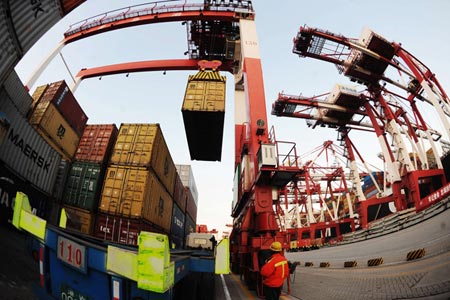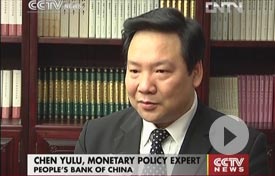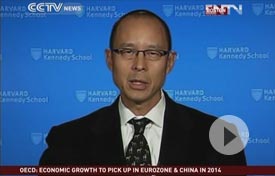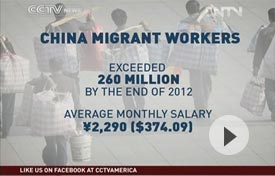

|
Editor's Note: The 18th CPC Central Committee, composed of more than 200 senior Party officials, held its third plenum on Nov 9 - 12 to discuss major economic and social issues concerning comprehensive reform. The third plenum issued a communique, which is regarded as the roadmap of deepening reform. (All-round reform) |
|
|
Sustainable and quality growth 'to be achieved' China's deepened reform will lead to a more sustainable growth and help stabilize the global economy, experts said. The Party pledged to let markets play a decisive role in allocating resources as it unveiled a reform agenda for the next decade. Communique encouraging: US expert The communique is encouraging for its hard push on reforms, said Stephen Roach, a senior fellow at Yale University. Moreover, Roach believes many multinational companies have well-established business in China and would like to expand. |
|
Highlights of the Communique |
|
China is to promote an economy with diverse forms of ownership, according to the communique issued after a key meeting of the Communist Party of China (CPC) Central Committee. Read more>>
|
|
Market to play 'decisive' role in allocating resources The Communist Party of China (CPC) has acknowledged the market's "decisive" role in allocating resources, according to a communique issued after its key session about reform. Read more>> |
|
China is to relax investment restrictions and accelerate construction of free trade zones (FTZ), said a communique released after a key meeting on reform. Read more>>
|
|
communique issued on Tuesday after a key meeting of the Communist Party of China (CPC) says government functions must be transformed in a down-to-earth manner to establish a law-based and service-oriented government.Read more>>
|
|
A modern fiscal system that supports the initiative of both central and local authorities should be set up, said a communique issued Tuesday after a key meeting of the Communist Party of China (CPC). Read more>>
|
 A new, integrated system of urban-rural relations will allow people living outside cities equal participation in modernization and better property rights, says a communique following the Communist Party of China (CPC)'s key session on reform. Read more>>
|
 The Communist Party of China (CPC) has vowed to establish a sound system to protect the country's ecological environment, according to a communique released after a key session about reform. Read more>>
|
|
Opinion |
|
 |
Communique reveals long-term goals for economy A four-day key meeting of the 18th Central Committee of the Communist Party of China ended Tuesday with a communique revealing the Chinese leadership's long-term goals. The communique said the meeting has approved "a decision on major issues concerning comprehensive and far-reaching reforms." "economic reform is key, and the core solution is the proper relationship between the government and the market, leaving the market to play the 'decisive' role in the allocation of resources, and the government to play a better role." Read more>> |
|
China signals readiness for deeper reforms The just-concluded plenum of the Communist Party of China sent a firm signal to the global community that the world's second largest economy will carry out comprehensive and deeper reforms, say overseas experts and media. At the close of the Third Plenary Session of the 18th CPC Central Committee on Tuesday, a decision was approved on "major issues concerning comprehensively deepening reforms", according to a communique issued after the meeting. Read more>> |
|
Overseas perspectives |
|
 |
China is on the right path filled with challenges UBS Securities published its latest A-share strategy report "18th Third Plenary Session communique -- on the right path filled with challenges". Below please find the highlights: The communique highlighted the role of the market; specifically, it changed the market's "fundamental role" to a "decisive role" in resource allocation. The communique mentioned that "economic reform is the focus for comprehensive deepening of reforms" and the "core issue is dealing with the relationship between the government and the market", reflecting the determination to deepen the reforms. Read more>> |
|
S&P: reforms to support China's credit rating The implementation of reforms that support the decisive role of market forces in the allocation of resources could in turn support long-term sovereign credit ratings on China, Standard & Poor's said in a report on Wednesday. The Third Plenary Session of the 18th Communist Party of China Central Committee has highlighted the importance for the central government to increase the efficiency of the state sector. Read more>> |
|
|
Expert's view |
|
Nonpublic sector China's basic economic system depends on public ownership as its main element but allows for various ownership models. Both public and nonpublic ownership are important components. The communique shows that the leadership's policy on the nonpublic sector, especially on the small and medium-sized enterprises, is consistent. This sends a positive signal to private investors. Now the thing is to turn words into action. Although the government had promised to support the private sector, initiatives were not carried out well because of institutional barriers. As a recent judicial document has called for equal treatment of public and nonpublic sectors, it is likely that other institutional barriers will be broken. The private sector may be allowed to invest in State-owned assets and monopoly industries and to acquire resources on an equal basis as other investors. Such changes will be difficult and gradual, since the central government has to deal with interest groups. But despite the difficulties, the change is necessary at a time when maintaining employment is crucial. Small and mediumsized enterprises provide more than 85 percent of employment. |
|
Market role A unified, open market with orderly competition is needed to let the market play a decisive role in resource allocation. Reform in this regard is to address three major obstacles for building a unified and open market. First, China's industrial policy leans toward certain industries selected by the government that receive favorable treatment. But this is not in line with the goal of building a "competitive" and "equitable" market. Reform is expected to reduce and eliminate the government's micro-level maneuvering in the economy. Second, despite progress in the past decade, China's market is still heavily fragmented by different industries and local governments. For example, before the current Ministry of Transport was reorganized, the logistics industry was divided by railways, roads, waterways and aviation, each administrated by different agencies. Local protectionism is widespread. For example, local governments insist on using local equipment and transportation vehicles. All these factors hindered a unified national market. Third, industries often face excessive administrative charges and fines because of irregularities in government supervision. |
|
Government role Government functions must be transformed in a down-to-earth manner to establish a law-based and service-oriented government. China needs to deepen reforms of the administrative system and innovate administrative methods. The restructuring of the administrative system is a major part of political reform. I think the effective government management mentioned in the communique requires the government to transform its function to maintain social justice, and provide a better environment and public services. Previously, many people complained that it was difficulty to obtain government services. Now people can solve their problems and get more comprehensive services in an administrative service center under many local governments. I think it's an innovation of administrative management and can boost government credibility. All in all, the key task of the administrative reform, I think, is to have statutory power for responsibility and procedure. The government should know more clearly about what it is doing, what it should do, and how it can do it. Modernizing governance is the goal of the reform, and I feel that the government has moved toward modern public administration from traditional management. |
|
Fiscal reform Reform in the fiscal and tax field, which was seen as a pillar in running the country, will focus on improving legislation, fairness and efficiency, and stabilizing the tax burden, to build a modern fiscal system. Public finance plays a fundamental role in the country's governance, which was never before given so much importance. Fiscal reform will play a key role in ensuring efficiency and fairness. Also mentioned for the first time in the communique was that the tax burden will stabilize, meaning that the growth in fiscal revenue will be in line with economic growth, rather than the previous thinking of "the more the better". But this doesn't necessarily mean that the tax reforms, which are already in progress, will be suspended or delayed. The reform to replace business taxes with value-added taxes to avoid duplicated taxation and ease the tax burden will continue, while environmental and resource taxes will be the major factor in the next round of tax reform. Last but not least, the communique called for matching fiscal revenue and expenditure, which was designed to ease the excessive liabilities on the shoulders of local governments. In the future, the central government will shoulder more expenditure. |
|
Urban-rural issue Farmers should have more proprietary rights. Rural and urban matters should be exchanged equally. A unified market should be established for construction land in both urban and rural areas. To build a unified market for construction land in the city and countryside, the government must allow rural collective land to enter the market. There are many strict restrictions that prevent farmers from trading their contracted land, construction land and houses, which are important sources of property income. Some places in Zhejiang and Guangdong provinces have piloted this reform for years. It is time to learn from these pilot programs and remove the institutional barriers hindering reform nationwide. There should be equal treatment, in terms of property rights and land prices, for construction land in the city and in the countryside. Only a fair and equal market can guarantee the free transfer of land. The government should give farmers the power to sell, mortgage and rent their land and houses. Allowing construction land in rural areas to enter the land transfer market is a necessary trend for China. But the authorities must first confirm those with property rights and set up a reasonable profit distribution mechanism. |
|
Opening-up New policies will apply both to domestic and international fronts. China will lower the investment threshold, step up the development of free trade zones and increase opening-up of inland, coastal and border areas. Expanding the scope, and quickening the pace, of opening-up is stressed, which means the Chinese economy will be increasingly integrated with the world economy. During the initial years of the opening-up process, our awareness of international rules was weak, but our opening-up efforts came into line with global rules since China joined the World Trade Organization. However, our opening-up at that time was selective, which meant we largely opened up sectors in which China enjoyed comparative advantages. For those industries where our advantages were poor, such as the trade in services, we tended to be conservative in opening up and retained the monopoly of State-owned enterprises in some sectors. The plenary meeting charts a new path, which means State monopolies will be limited and access to foreign investors will be broadened. A new opening-up system will be established based on the example of the Shanghai Free Trade Zone. The effort is to establish a totally free trade system by loosening entry controls. The essence of the effort is to allow all qualified companies to enter the market. |
|
Culture industry The cultural management system should be improved to build and perfect the contemporary cultural market, establish a public cultural service system and raise the level of openness. The reform of the cultural management system has been ongoing since 2003, with the main aim to let the market play its role in the culture industry, and let the government focus on public cultural service. In the past decade, work has been done to transform many State-owned cultural institutions into businesses. The government has basically established a public cultural service system and a contemporary cultural market. I would interpret the part related to the culture industry of the communique as setting a higher standard for the quality of the ongoing reform. We can expect that the market will play a more important role in the culture industry. In the previous seven third plenary sessions of the Central Committee since 1978, the communique has mentioned a focus on economic development five times and twice mentioned agricultural reform. This is the first time it has raised culture to the same level as economic development. |
|
Ecology A comprehensive system for ecological progress that protects the environment will be established. A compensation system for the use of resources and a system of ecological compensation will be implemented. Environmental protection is among the Party's top priorities and the meeting lays out a comprehensive blueprint for the building of an ecological civilization. Top policymakers have pledged to reform the current environmental protection system and establish an integrated mechanism that monitors all pollutants. Reform of the environmental protection system is one of the major parts of China's economic transformation and a precondition for low-carbon development. It is central to solving the environmental hazards that harm the public's health. We must strive to safeguard the indivisibility, diversity and sustainability of our ecological circle and enhance the integration and effectiveness of supervision efforts. Reform of environmental protection systems requires comprehensive, sophisticated and systematic efforts. |
|
Video |
 |
 |
 |